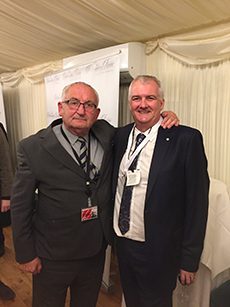Textile recycling company BIU Group has had its business model included in a 2017 edition of The Parliamentary Review, a publication that aims to share best practice among policymakers and business leaders.
The firm collects and recycles unwanted clothes, shoes and household textiles, then sells the items on to raise money for its charity partners, which include the Yorkshire Air Ambulance. Since its formation in 2005, BIU has generated £8m for good causes.
Each edition of The Parliamentary Review focuses on a key governmental policy area, the one in question addressing businesses which are helping the environment. It showcases examples of best practice in the private and public sector.
BIU has succeeded with an innovative and unusual business model. The document covers aspects of how the firm operates, including its forging of long-term relationships with charities, waste management companies, supermarkets and local authorities. Its textile recycling banks are located on sites operated by these kinds of firms. Collected garments are assessed and sold on to companies across the UK, Europe, the Middle East and Asia.
Anything that’s not able to be re-worn is recycled into industrial wipes and new fibres. BIU then donates an agreed portion of money from these commercial sales to its charity partners.
The company manufactures and refurbishes its own unique, anti-theft textile recycling banks.

Quality control takes place at collection and at depots, ensuring unsuitable donations are removed at source. Reusable and recyclable garments are sold, with an agreed rate from the sale of every kilo paid to charity partners.
The latter include the Yorkshire Air Ambulance (BIU’s first charity partnership forged in 2005); other air ambulance schemes in Dorset, Thames Valley and South Central; a children’s hospice; a new cancer treatment centre; and the Wigan Warriors (rugby league team) Community Foundation. There is no cost to the charities as BIU provides all equipment and transport.
The company also provides services to local councils, waste management firms and other organisations needing a partner to collect used textiles at banks and recycling centres. A rate per tonne is paid for stock collected, which helps fund public services while preventing used textiles going to landfill.
BIU is currently working towards a zero-waste policy, with the aim of reducing the volume of textiles going to landfill, while the current 50-strong fleet of vehicles will be replaced in the near future, to minimise emissions.
David Swindells, BIU Group’s Managing Director, said: “We are delighted our innovative business model has been recognised in the Parliamentary Review. Our motto is Excellence Always and while we can’t control global issues, we do have a flexible business model and are constantly improving and trying new approaches. Excellence Always is not just a strapline, it’s a driving force that binds and motivates the entire team, to make a positive difference.”
The Parliamentary Review is sent to more than 500,000 leading policy makers and is seen as both a blueprint for success and a template for reform.
In the foreword to the 2017 edition, Prime Minister Theresa May comments: “This year’s Parliamentary Review follows a significant year in British politics and this is reflected in the articles from leading journalists and best-practice representatives alike.”








